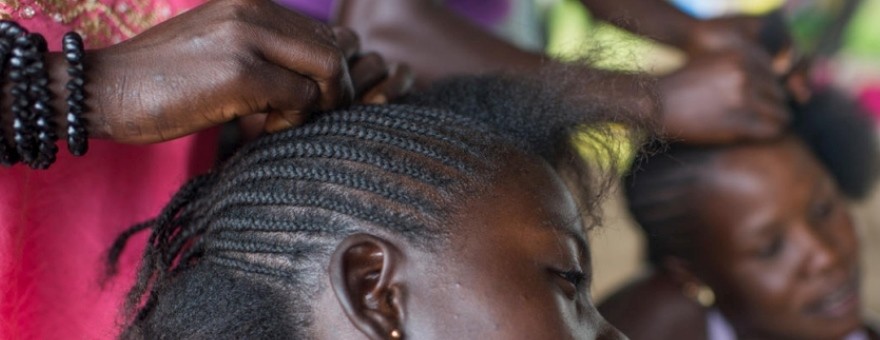Business owners specialized in tailoring, barber and saloons in Torit have complained that the Covid-19 pandemic has impacted negatively on their businesses and families as customers diminish.
“Actually, the life is really difficult. Before the Corona came we were making school uniforms and supplying them to schools and we were also training some women with tailoring skills before COVID-19,” said Agnes Ayoo, a female tailor in Torit main market. “When the Corona came we are all in lockdown. We have been at home and the life become difficult, the little money we have inside we ate and it is over.”
Currently, South Sudan has so far reported more than 1,800 confirmed cases, and 31 deaths, while 89 people have recovered from the COVID-19 disease. The government has closed schools and taken other actions as a precaution to reduce the spread of the virus.
Ayoo, a mother of 9 children, told Radio Tamazuj on Friday last week that she used to mend school uniforms which cannot work now due to closure of schools. She said her business place used to be full.
“Actually I lost the customers, right now as you have seen my place, the place was not like this before, this place was a busy place with a lot of money, even now, and some uniforms are at school unsold, no money,” she added.
Emmanuel Ohure, a barber working currently in “Peter and brothers saloon,” also said the businesses have dropped badly.
“You can sometimes save around like 10 to 15 customers per day but because of this sickness, we see is reduction in number of our clients,” said Ohure. Still, he said he urges business men and women to stay vigilant and continue with preventive measures to combat the deadly virus.
Kaltuma Venesa, another business woman working in saloons, said she is continuing with the business despite Covid-19, but using new safety measures, in order to feed her family.
“You can get one or two (customers) come in a day to make their hair sometimes and you stay after two days, without seeing customer coming to the saloon for hair plaiting,” she said. “Plaiting of hair is 2,000 SSP and to buy a wave is 3,000 SSP making the total cost to 5,000 SSP.”
Venesa adds that although they remain open, she is always wearing a face mask while plaiting hairs as one of the measures to fight Covid-19.
“In terms of safety when you are plaiting somebody hair, it’s difficult to plait someone hair while applying social distance unless putting on mask,” said Venesa. “We have (masks) for ourselves but the clients always come with their mask.”
According to the World Health Organization, uses of masks by the general population in the community setting are to reduce potential exposure from someone who is sick and contagious, but may not have symptoms. The South Sudanese government has ordered people to wear masks in public areas.
“Masks should be used as part of a comprehensive strategy of measures to suppress transmission and save lives; the use of a mask alone is not sufficient to provide an adequate level of protection against COVID-19,” WHO has recommended.
Victoria Nabataji, another business lady in Torit town also said fear of Coronavirus has increased poverty in her family, saying that her level of income was good before the virus outbreak.
“I have a family in Uganda and am also taking care of my parents,” she said. “My mother is sick of diabetes so I need to send money after every week which per now, I cannot do it.”
She used to earn an average of 10,000 SSP in a day but it has reduced to half or even less than that amount.
“Before the lockdown we are good, but now things in lockdown are not moving on as well as it used to be,” she said. “Reduction in customers, reduction in money and also reduction in work.”




